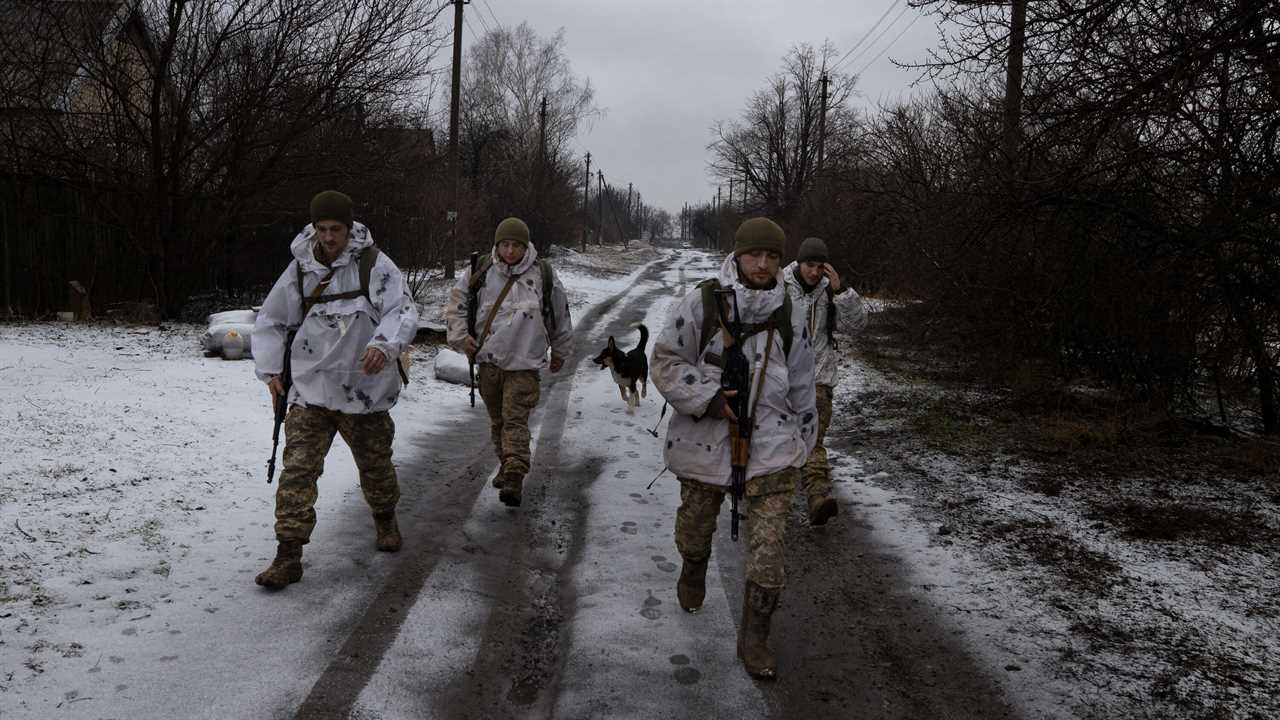
KYIV, Ukraine — Ukraine’s military warned on Friday that Russian-backed separatists in the country’s east are conducting military exercises, completing a near encirclement of Ukraine by hostile forces, even as diplomatic initiatives have failed to gain traction.
The drills tested the force’s preparation for live fire operations, practicing “driving artillery, tank and armored vehicles” in field exercises, the Ukrainian statement said. The statement said some units of the force were put on their highest level of alert and that senior Russian military officers were observing the activity.
The warning was the latest evidence of a shift by Kyiv to more alarming commentary about the military risk facing Ukraine. That follows weeks of efforts to minimize the threat of an invasion, seeking to calm the public and limit the economic fallout from rising tensions.
Ukraine this week began its own nationwide military exercises to coincide with joint Russian and Belarusian exercises to the north of Ukraine, in Belarus.
To the south, the Russian Navy announced on Thursday the closure of large swaths of the Black Sea and the Sea of Azov for live-fire exercises by its fleet that will effectively blockade Ukrainian ports including the port of Odessa. The naval exercises were scheduled to begin Sunday and last six days. Russia has massed armored vehicles and soldiers near its borders to the northeast of Ukraine and in the south on the Crimean Peninsula, which Moscow annexed in 2014.
To the east, the army of Russian-backed separatist in two enclaves in eastern Ukraine, the Donetsk and Luhansk peoples’ republics, was put on partial alert and ordered to conduct field exercises, Ukraine’s military intelligence agency said Friday in a statement.
Ukraine and Western governments view the separatist army, believed to consist of about 30,000 troops, as controlled and armed by the Russian government, while Russian officials including President Vladimir V. Putin have consistently denied any Russian role in the conflict.
In news conferences that extended after midnight in Berlin, both Russian and Ukrainian negotiators said a channel of talks supported by President Emmanuel Macron of France had brought no breakthroughs so far.
The negotiations focused on a settlement agreement for the eastern Ukraine war but were seen as a possible path to ease the wider tensions from the Russian buildup. They were the second this year by foreign policy advisers to the French, German, Russian and Ukrainian governments.
“It would be good if during the second meeting we could agree on something,” Andriy Yermak, Ukraine’s chief negotiator, said. After nine hours of talks the negotiators could not agree on a joint statement. “It went the way it did today,” Mr. Yermak said.
Russia’s negotiator, Dmitri Kozak, offered an even more dour assessment. He said the Ukrainian government had not altered its longstanding positions in the settlement talks for the eastern Ukraine conflict, which have been ongoing for seven years.
Separate talks in Moscow between the British foreign secretary, Liz Truss, and Russia’s foreign minister, Sergey L. Lavrov, also went nowhere, with Mr. Lavrov comparing them to, “the conversation of a mute person with a deaf person.”
Ms. Truss had said one purpose of the visit was to convey to Russian officials warnings about the seriousness of Western economic sanctions and other repercussions if they use military force in Ukraine.
Mr. Lavrov countered by reiterating Russia’s position that it has no plans to invade Ukraine and that its military is merely conducting exercises.
While diplomacy has borne little or no fruit so far in the crisis, it is not for want of trying by numerous parties.
Turkey’s president, Recep Tayyip Erdogan, has offered to mediate, a proposal accepted by Ukraine but declined by Russia. Next week, the German chancellor, Olaf Scholz, is scheduled to visit Kyiv and Moscow. And Russian officials have said they will respond in writing to proposals for security talks offered by the United States and NATO.
Russia has made a series of demands of the West, including scaling back the NATO military presence in Eastern Europe to 1990s levels and guaranteeing that Ukraine could never join NATO. The United States has called those demands “non-starters’’ and instead offered a series of proposals aimed at arms control.
Title: Russia-Backed Separatists Conduct Military Exercises, Ukraine Warns
Sourced From: www.nytimes.com/2022/02/11/world/europe/ukraine-russia-diplomacy.html
Published Date: Fri, 11 Feb 2022 14:59:56 +0000
Did you miss our previous article...
https://rsssuperfeeds.com/viral-news/the-us-shows-asia-its-foreign-policy-focus-as-other-hot-spots-boil






